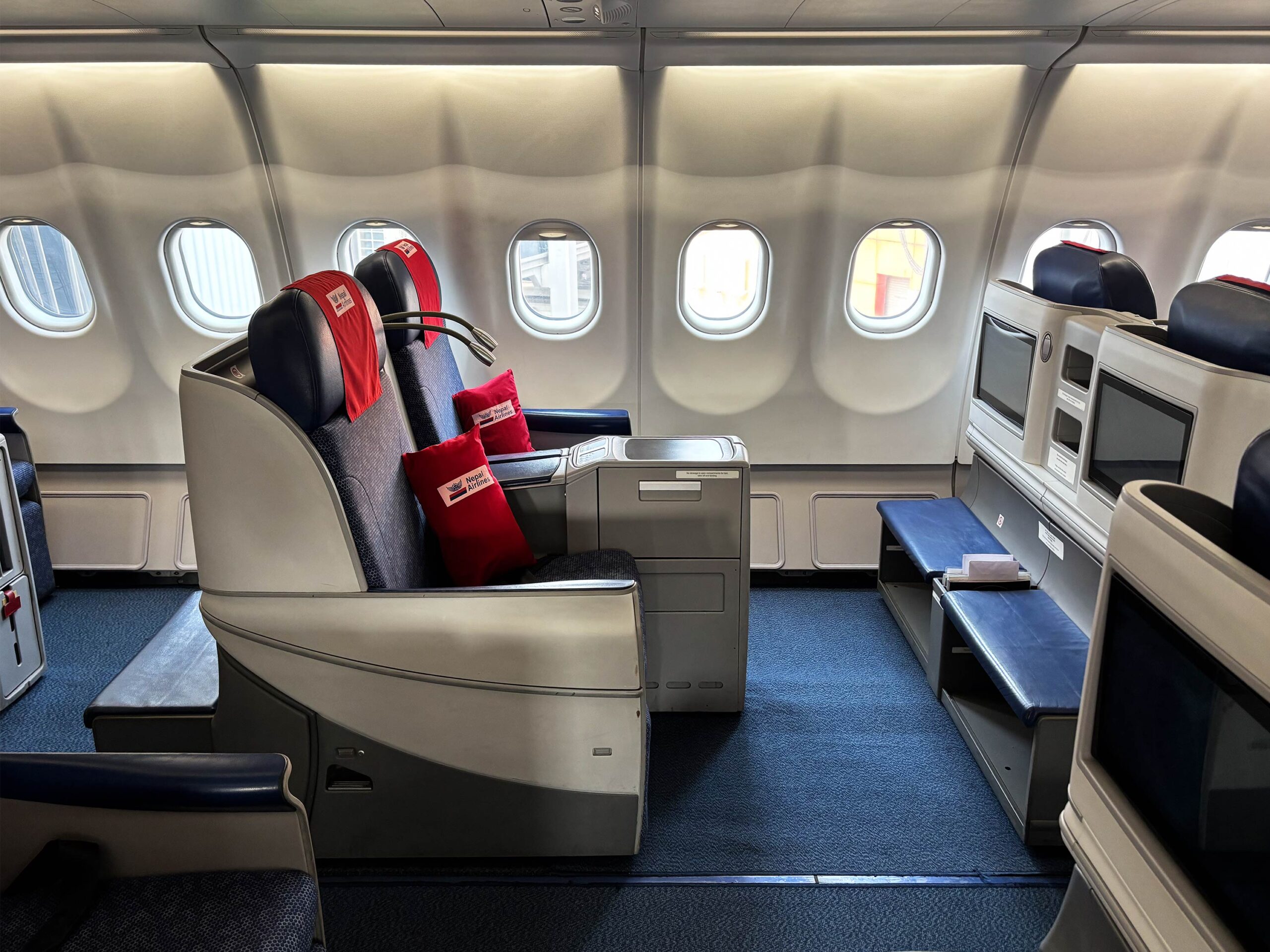
Nepal Airlines flight details
Airline : Nepal Airlines
Flight No : RA218
Departure City : Delhi – Indira Gandhi (DEL)
Arrival City : Kathmandu – Tribhuvan (KTM)
Equipment : A330-200 (9N-ALZ)
Blocked Time : 1h30m
Seat No: 2K
Nepal Airlines is the national flag carrier of the namesake Himalayan country. The airline has in recent years reinvented itself following decades of mismanagement and reliability issues. This culmulated in the acquisition of its current fleet of modern Airbus A320s and A330s, alongside online booking services for its flights. This was my first time flying Nepal Airlines, so naturally, I was very excited for this flight.
Booking Nepal Airlines
While Nepal Airlines operate regular flights to Mumbai, I decided to fly to Delhi on Air India so I can fly the airline’s longhaul Airbus A330-200 product. Delhi is one of only three destinations served by this aircraft, alongside Tokyo Narita and Doha. I booked my flight on the Nepal Airlines website, paying a fare of USD 206 (~ GBP 159) for this one way flight between Delhi and Kathmandu.
Check-in
After a leisurely 35 minute Uber ride from The LaLiT New Delhi, I was dropped off at Indira Gandhi International Airport Terminal 3. Before I could enter the terminal however, I had to undergo a document check at the entrance, as is standard in Indian airports.

Once inside, I quickly found the Nepal Airlines check-in counters which are located on Island D. There, a bit of a queue had developed in the Economy Class line. On the other hand, the atmosphere was lonely at the Business Class counters; these were deserted and roped off owing to the lack of other passengers booked in the cabin.

After confirming my return flight out of Nepal, I was soon checked in. Before long, I had my bags were tagged and I was handed my boarding pass and lounge invitation. How exciting!
Lounge
Nepal Airlines uses the Encalm Privé Lounge in Terminal 3. Considering that is is a contract lounge I have never heard of, I came in with very low expectations. Instead, I was blown away. This had to be one of the best Business Class lounges out there! With endless amenities, great and spacious seating, and food rivalling five-star hotel buffets, the Encalm Privé Lounge was a spectacle of its own. You can read my review of the Encalm Privé Lounge in a separate instalment here.
Boarding
Having spent about two hours in the Encalm Privé Lounge, I decided to leave for the gate in hopes of being the first to board the aircraft. After all, I’ve got to get those empty cabin pictures somehow, don’t I? 😉

We were assigned Gate 1, which ordinarily seems to be used for US-bound flights thanks to its secondary screening facilities. However, as we were flying to Kathmandu, none of that was necessary. Regardless, I was genuinely impressed by how nice Indira Gandhi International Airport is! For one, the red carpeted floors, grey ceilings, and terminal seating really reminded me of the gates at Singapore Changi Airport Terminal 3.

At the gate, I found myself amidst a sea of people, all of whom appeared to be flying home to Nepal. While I struggled to find an empty seat, it didn’t take long before the commencement of boarding was announced. Preboarding commenced at 15.58, followed immediately by Business Class.

Interestingly, the gate is set up so that First/Business Class boarding is completely separated from Economy Class. On top of a separate jetbridge, even the boarding door and walkway to the jetbridge are separate. How peculiar!

As I got down to the jetbridge, I finally had the chance to get a close look at our Nepal Airlines jet. Operating our flight today is 9N-ALZ, named Makalu, an Airbus A330-200 delivered new to Nepal Airlines in July 2018. What a beauty!

Nepal Airlines A330 Cabin
Nepal Airlines’ Airbus A330-200s feature 274 seats in a high-density configuration. In Business Class, there are a total of 18 seats configured in a relatively outdated 2-2-2 configuration set between Doors 1 and 2. The remaining 256 seats are in Economy Class, in a standard 2-4-2 configuration, which looked quite comfortable!


Business Class cabin
On their flagship Airbus A330-200s, Nepal Airlines uses the forward-facing Safran Aura Lite seats. I am very familiar with this seat, having previously experienced the same product on China Eastern’s A330-200 and LATAM Chile’s Boeing 787-9. Arranged in pairs of two, each seat is separated by a sizeable centre console that houses the tray table and seat controls.


Despite being an outdated product, the seats still represented a quantum leap for the airline. Historically, Nepal Airlines has only offered recliner seats in Business Class. As such, both flatbed seats and inflight entertainment screens were novel frills for the airline, having been introduced on this aircraft.


Thanks to the open 2-2-2 configuration of the flatbed seats, there are no constraining footwells. As such, there is no meaningful difference when it comes to space between the bulkhead and normal seats. In fact, I’d avoid the bulkhead seats due to their proximity to the galley; by design, they also eschew the small glove compartments and coat hooks available at every other seat.


Seat Details
On this flight, I was assigned 2K, the right-hand window seat in the second row of Business Class. Complementing the depiction of Mt Everest on the bulkhead, the seats are upholstered in a blue stippled fabric that evokes a traditional Nepalese pattern. A small red pillow accompanies the seat at boarding.


Across the seat, you’ll find the prominent 17.3-inch LED entertainment screen and the fully-exposed ottoman, alongside a shallow glove compartment and a coat hook. Nicely enough, there’s an opening under the ottoman, which is large enough to fit a large handbag or briefcase on top of a pair of shoes. Furthermore, there is also a literature compartment set between the ottomans.



On the centre console are seat controls, which are intuitive and user friendly. Under this is the seat’s tray table, which pulls right out of the centre console. As with any Safran Aura Lite seat, I found the table to be sturdy and suitable as a work surface. Furthermore, under the armrest you’ll find a shallow cubby housing the power outlet, alongside the remote control, a water bottle holder, a USB-A port, and the headphone jack.




I’ll also add that there are a pair of reading lamps located between the seat pairs, complementing those on the overhead panel.


While no longer cutting edge, the product remains very comfortable – especially when you’re travelling with someone. The lack of partitions between the seats also makes it easy to talk with your seatmate. As Nepal is more of a tourism destination than a business one, it makes sense that they’d install this product.
Departure from Delhi
As boarding went underway, the cabin crew came over to us to introduce themselves and offered a predeparture beverage of apple juice with no choice offerd. Refreshing wipes were handed alongside the drinks. Business Class stayed empty for a while, which had me guessing that we’d be the only two passengers in the cabin. However, nearly the whole cabin filled up suddenly as boarding was nearly completed. While everybody else were also offered pre-departure beverages, they came in paper cups. It soon dawned on me they were upgraded, as Economy Class was oversold.


The doors were closed 40 minutes after boarding began. By this time Captain Raman Kimiri came on the intercom to welcome us aboard and stated our short flight time of one hour and five minutes to Kathmandu. Afterwards, the cabin crew conducted a manual safety demonstration in the cabin.

We started pushback fives minutes later at 16.43, seven minutes before our scheduled departure time. As we taxied to the runway, the crew came by to ask about our meal and beverage preferences after takeoff. I’ll expand more on this later on in the review. In the time it took us to get to the runway, I was surprised to see a significant SpiceJet presence at the airport, moreso than any other airline!





Owing to the busy afternoon and hazy conditions at Indira Gandhi International Airport, it took us 20 minutes to finally reach Runway 29R for our turn to take off. We finally took off at 17.04 soaring away into the smoggy skies of Delhi!





Inflight Entertainment
About six minutes after takeoff, the seatbelt signs were turned off. As the crew started preparations for the inflight service, I decided to browse around the airline’s entertainment system again. While I briefly checked out the system during boarding, I was admittedly getting quite bored and wanted to see if there was anything possibly interesting to watch. For one, the crisp screen, its black bezel, as well as the system’s layout really reminded me of that on Batik Air’s Airbus A320s.


While the monitor is quick and intuitive, it was quite hard to use the touchscreen due to its distance from the seat. Instead, I relied on the handheld remote, which has a mouse-like scroll function in the form of a square button-like protusion. Additionally, a pair of sturdy headphones were also offered with the system, which was useable despite its scratched up condition.


While the availability of an entertainment system is quite commendable on the part of Nepal Airlines, it was honestly very limited in scope. In total there were merely a selection of 37 films, encompassing all genres. Considering how limited the selection was, it seemed like the monitor was almost a waste of space! To make things worse, the inflight map wasn’t working either, making the system even less useful.


At the very least, I appreciate that Nepal Airlines still publishes an inflight magazine, which I found quite informative.

Dinner Service
As we levelled out at our cruising altitude, by which time the crew came around to set up the tables. There were two choices of mains, including a chicken and potato curry and fish pasta dish. As there were no menus were available on this flight, all our meal and beverage options were described verbally by the crew. In terms of beverage options, available was a choice of either water, Coca-Cola, Sprite, boxed fruit juices, beer, a sweet red wine, or a whisky. I ended up deciding on a can of beer to drink.

Before long, the crew came back with our meal trays in hand. The meal itself consisted of a salad, a main, a dessert, bread, and packaged nuts, all of which were served on a single tray. Additionally, my beer turned out to be Heineken, which is a bit disappointing as I was hoping for something with a bit more local flair. After all, Nepal does have a lot of nice and interesting homegrown beers!

Meanwhile, all the other passengers were handed meal trays from a cart, featuring the Economy Class meal service. At the very least, hot meals were also offered, with a choice of chicken or mushroom rice.
Dinner
The main course of chicken and vegetable curry was served with a side of beetroot and almond salad and what I believe is rasmalai – an Bengal dessert of discs of curdled dairy soaked in milk and pistachios. Also provided was a stale breadroll as well as Nepal Airlines branded salted peanuts.

As I’ve never been a fan of beetroot, I can’t provide an unbiased opinion on the appetiser. However, I will say that the rasmalai was very nice, relatively light tasting dessert. Although, what can I say, I’ve liked all the Indian desserts I’ve tried! 😛

The main course, however, wasn’t great. Disregarding the unappetising presentation, I found the chicken to be chewy and noticeably a bad cut. Furthermore, the dish was not very flavourful with flavours didn’t seem to complement each other very well. This was very surprising, considering how the subcontinent’s spice-rich dishes usually shines inflight.

For reference, the following is what the other Business Class meal option looked like, which I was told to be quite lacklustre in itself.

Bedmode
After the meal, I decided to try out the flatbed function of the seat. Like most flatbed Business Class seats, the seatback has a hint of an angle when fully reclined. Regardless, I was impressed with how good the seat is as a bed. For one, I really liked the firm padding of the seat, which balances out the pathetic tiny pillows. Furthermore, the lack of a footwell makes a world of difference in comfort.



Lavatory
Before our arrival in Kathmandu, I quickly checked out the single lavatory located in front of the cabin. I was happy to find that the lavatory had been kept relatively clean and dry throughout the flight (despite the soap stain on the wash basin). In addition, there were also antibacterial wipes and hand sanitiser available by the sink. Surprisingly bottles of Dettol antiseptic liquid were also offered, which seemed completely random if you ask me!


Service
The two ladies working in Business Class couldn’t have been friendlier to us. On top of the regular service flow, they took their time to ask about our trip and whether or not this was our first time in Nepal. We even talked a bit about Nepal in general, before and I asked about the possibility of visiting Lumbini on a daytrip. For this I truly was grateful! However, I found it interesting how starkly the service is differentiated between paying passengers and those who were operationally upgraded.
While we were greeted with smiles and pleasantries, there was a noticeable souring mood when it came to providing service to the other passengers. Although I appreciate their friendliness to us, I wasn’t sure how to feel about this very blatant difference in treatment. For one, I’d imagine that on other airlines, the crew would try to minimise any service differences to op-up passengers. In any case, this was quite an intriguing sight to witness.
Arrival in Kathmandu
Approach
About twenty minutes before landing, Captain Kimiri came back on the intercom to announce the details of our descent. In particular, we were expected an on-time arrival at Tribhuvan International Airport, where the temperature was a crisp 14 degrees Celsius. At the same time, I found myself distratd by gorgeous views of the sunset outside. Thanks to the uniform cloud cover and the sun setting on the horizon, you could even slightly see the curvature of the Earth. What a sight to behold.

Five minutes after the captain’s announcement, the seatbelt signs were turned on. This prompted the cabin crew to do a final check of the cabin before having the lights turned off for landing. As we entered our final approach, the city of Kathmandu came into view, with a magnificent view of a sparkling sea of glimmering lights.


Arrival
Touching down in a way that’s neither smooth nor rough, we landed on Runway 02 at 18.28, seven minutes before our scheduled arrival time. Before long, we exited the runway just as we were about to approach the airport’s domestic terminal.



As we taxied to our parking stand, my eyes were glued outside the window, looking at all the other planes at the airport. Sadly, there wasn’t any interesting traffic around, apart from a couple of Himalaya Airlines Airbus A320neos and Nepal Airlines’ other Airbus A330-200.


We finally reached our final parking position at 18.30, next to a FlyDubai Boeing 737-8 which had just arrived from Dubai half an hour earlier. Accounting for the lack of jetbridges at Tribhuvan International, two airstairs were soon attached to our jet. As I disembarked, I made sure to thank the crew for the flight, before being awed by our stunning Airbus A330-200. Despite the design being over 30 years old, the Airbus A330 will always be a beauty in my eyes!



As is standard, we were transported to the terminal by bus. Sadly, there were no special buses for Business Class passengers, which meant that we had to wait for a bit before the bus left the stand. Regardless, however, I was happy to see that there were no lines for the Visa on Arrival. Better yet, there was also a Business Class immigration line, which meant that we were out of the airport in no time!

Verdict
Overall, I was quite impressed with my Nepal Airlines flight. I appreciate the friendly and well-intentioned crew and loved the excellent lounge provided at Delhi Airport. Despite the rather outdated product and lacklustre food, I felt that the airline is trying very hard to be competitive on the world stage. While I don’t think they will be winning any awards any time soon, Nepal Airlines surely isn’t an airline to avoid if you’re making your way to the Himalayan nation.
Read more from this trip here!


Leave a Reply